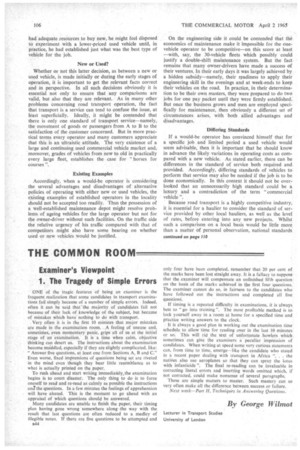THE COMMON ROOM
Page 108

If you've noticed an error in this article please click here to report it so we can fix it.
Examiner's Viewpoint 1. The Tragedy of Simple Errors
ONE of the tragic features of being an examiner is the frequent realization that some candidates in transport examinations fail simply because of a number of simple errors. Indeed, often it can be said that themajority of candidates fail not because of their lack of knowledge of the subject, but because of mistakes which have nothing to do with transport.
Very often it is in the first 10 minutes that major mistakes are made in the examination room...A feeling of unease and, sometimes, even momentary panic, grips all of us at the initial stage of an examination.' It is a time when calm, objective thinking can desert us. The instructions about the examination become muddled, especially if they are slightly complicated, like: "Answer five questions, at least one from Sections A, B and C." Even worse, fixed impressions of questions being set are riveted in the mind even though they bear little resemblance as to what is actually printed on the paper.
To rush ahead and start writing immediately,the examination begins is to court disaster. The only thing to do is to force oneself to read and re-read as calmly as possible the instructions anathe questions. In a few minutes the feelings of apprehension will have abated. This is the moment to go ahead with an appraisal of which questions should be answered.
Many candidates are unable to finish the paper, their timing plan having gone wrong somewhere along the way with the result that last questions are often reduced to a medley of illegible notes. If there are five questions to be attempted and
1344
only four have been completed, remember that 20 per cent of the marks have been lost straight away. It is a fallacy to suppose that the examiner will compensate an unfinished fifth question. on the basis of the marks achieved in the first four questions. The examiner cannot do so, in fairness to the candidates who have followed out the instructions and completed all five questions.
If timing is .a repeated difficulty in examinations, it is always best to "go into training ". The most profitable method is to lock yourself away in a room at home for a specified time and practice writing answers to the clock.
It is always a good plan in working out the examination time schedule to allow -time for reading over in the last 10 minutes or so. This will rid the text of unfortunate howlers which sometimes can give the examiners a peculiar impression of candidates. When writing at speed some very curious statements can, from time to time, emerge—like the candidate who stated in a recent paper dealing with transport in Africa ". . . the natives also use aeroplanes so that they can spray the lotus with infanticide ". The final re-reading can be invaluable in correcting literal errors and inserting words omitted which, if not corrected, could make nonsense of several paragraphs.
These are simple matters to master. Such mastery can so very often make all the difference between success or failure.
Next week—Part H, Techniques in Answering Questions. •
By George Wilmot


































































































































































